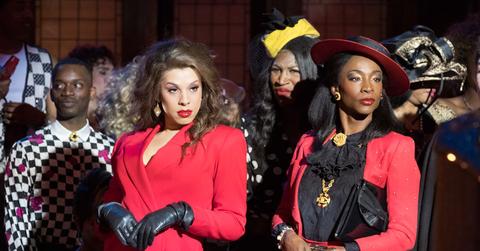
How 'Pose' Changed The Game
Pose of a feat of representation that gives voice and life to the most overlooked people and issues with a kindness that is hard to come by.
By Elysia TanswellAug. 28 2021, Published 1:00 p.m. ET
The FX series POSE first aired way back in the summer of 2018. It was written and directed by Janet Mock, who also acted as executive producer and co-created by Ryan Murphy.
The series is set in New York in the late 80s and early 90s. It follows the story of ball culture and the gay and trans community. The characters deal with all the big issues of the period. The AIDS crisis, poverty, discrimination, and the drug crisis. It is also a groundbreaking feat of representation that has changed the TV game for the good, in more ways than one.
Who the main characters are
Just the core concept of POSE is revolutionary. A TV show where the main cast is comprised of queer people of color. With trans women played by trans women, and no white straight character’s acting as a guide or window into the world. That is not a common thing in the American media landscape. Whilst Orange Is The New Black has been praised for its host of diverse characters the creator explained that she had to use the white lead as a “trojan horse” and was criticized for exploiting them in later seasons.
POSE makes no attempt to hide who this story is about and even less attempt to apologize for it.
The Issues
Whilst a lot of the show has a positive vibe, it can and does get serious and cover important issues. Characters deal with the AIDS crisis. The fear of contraction, the fear after diagnoses, the pain the disease causes. But also the bigotry and failure of systems that should be protecting the community from harm, something that other media on the topic has struggled with. The show also takes a hard look and the complicated reality of trans life. Discrimination, violence, lack of help from the police, access to surgery. But also sisterhood and the strength of community. Poverty is a constant worry throughout the series as are the systems that stop the characters from escaping it. Even the ball itself does not escape criticism, as the show also looks at the unfairness of all-male panels, the unfair body and beauty standards applied to the women, and the appropriation of ball culture by white celebrities.
The humanization of sex workers
There is an episode of Elementary, (a modern adaptation of Sherlock Holmes starring Johnny Lee Miller and Lucy Liu) that starts with a dominatrix finding her client dead in his home. The main cast shows up to the scene to investigate. After the woman explains how she found the body, the police chief tells a male detective to take her aside to take her full statement. At this moment, without quite realizing why, I braced myself for a leer, or an eyebrow raise. Some kind of crude joke at the detective’s proximity to a sex worker. It was only when I was surprised by the moment’s absence that I realized why I was expecting it. I had never seen a piece of media that did not make a mockery of objectifying or dehumanizing sex workers.
Sex workers in media are background characters in gangsta movie shootouts who get killed in the crossfires while naked and are never addressed again. Or they are nameless victims in police procedurals. They are the body that a fixer disposes of after a wealthy man kills her. You may find the occasional ‘hooker with a heart of gold‘ who is too good and pure to be in the profession, unlike those around her who are lowly and deserve any mistreatment that comes their way.
But you don’t often find real humans, and certainly not ones who are poor, black, and queer.
In POSE there are fully fleshed out characters with interior lives, who also engage in sex work. They are not judged for it. The show deals with the fact that trans women, particularly trans women of colour of the time were often forced into sex work due to a lack of opportunity. But there are never gratuitous scenes of violence against the women. The camera does not leer at them. One character even finds herself in sex work that she finds enjoyable and fulfilling. And when a character is killed by a male client, an all too common problem in real life, the situation is treated with the gravity it deserves. We see the pain of her friends and chosen family. The complicated feelings of her bigoted biological family. We even see all the things she wanted to do in her life.
POSE is a feat of representation that gives voice and life to the most overlooked people and issues with a kindness that is hard to come by.

